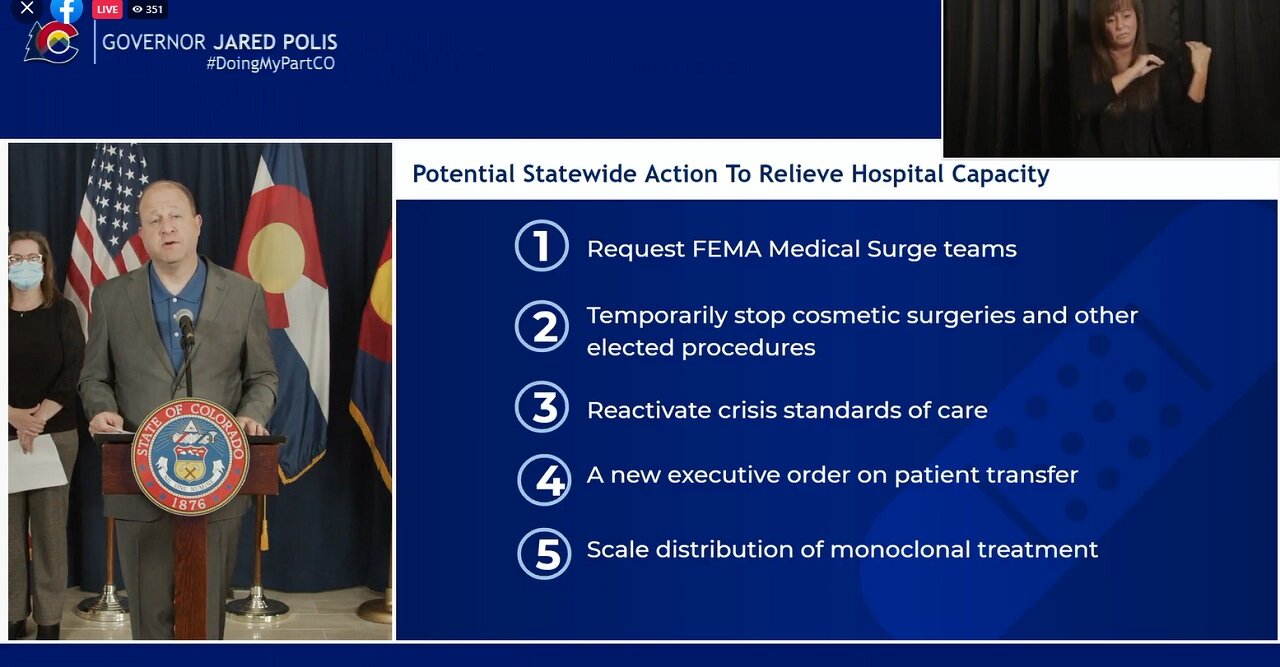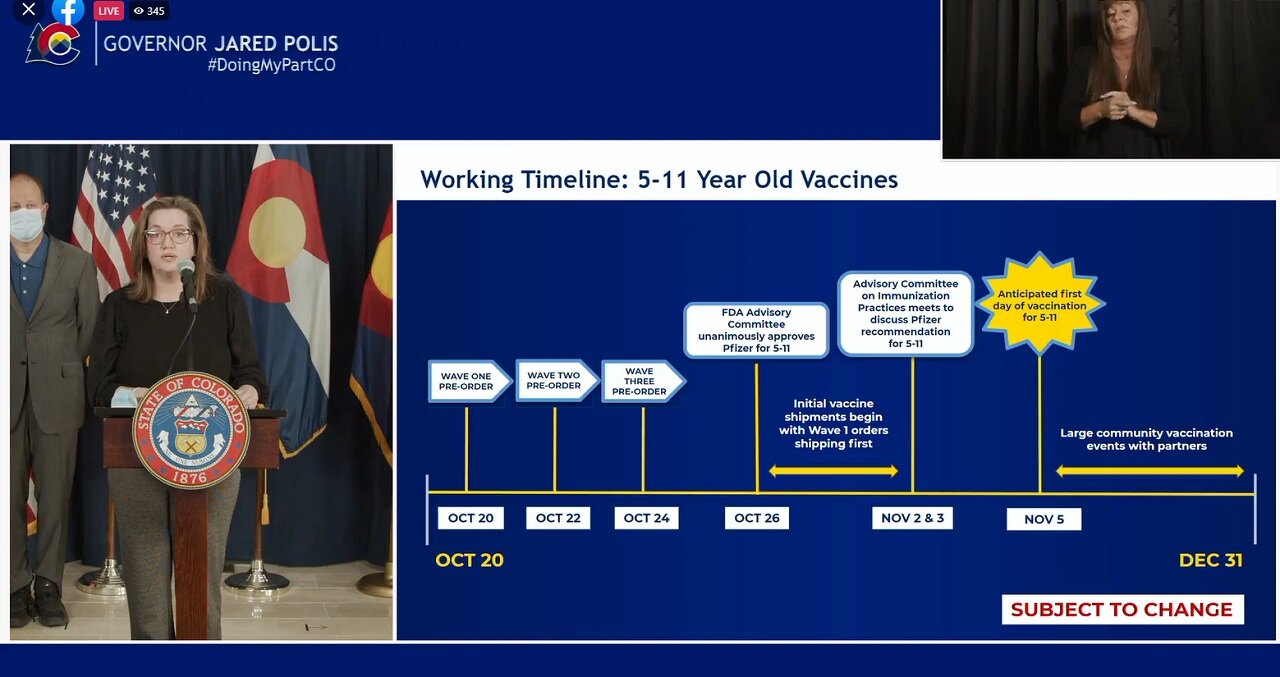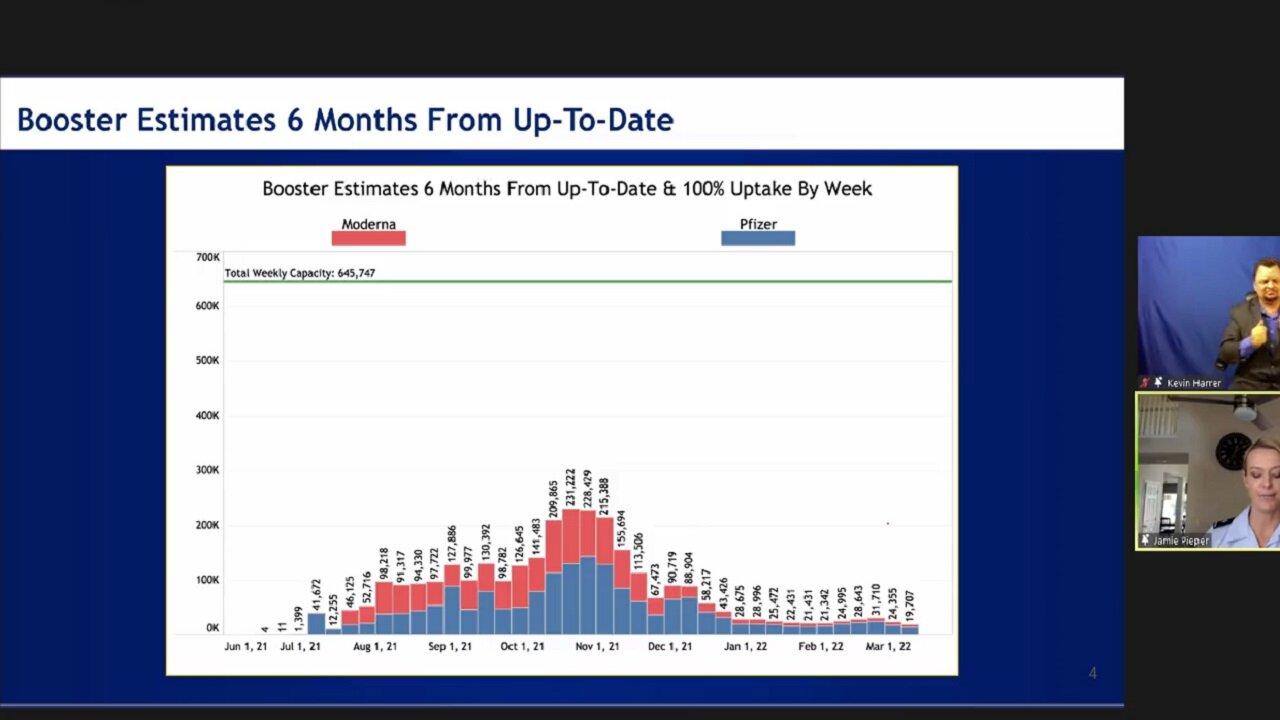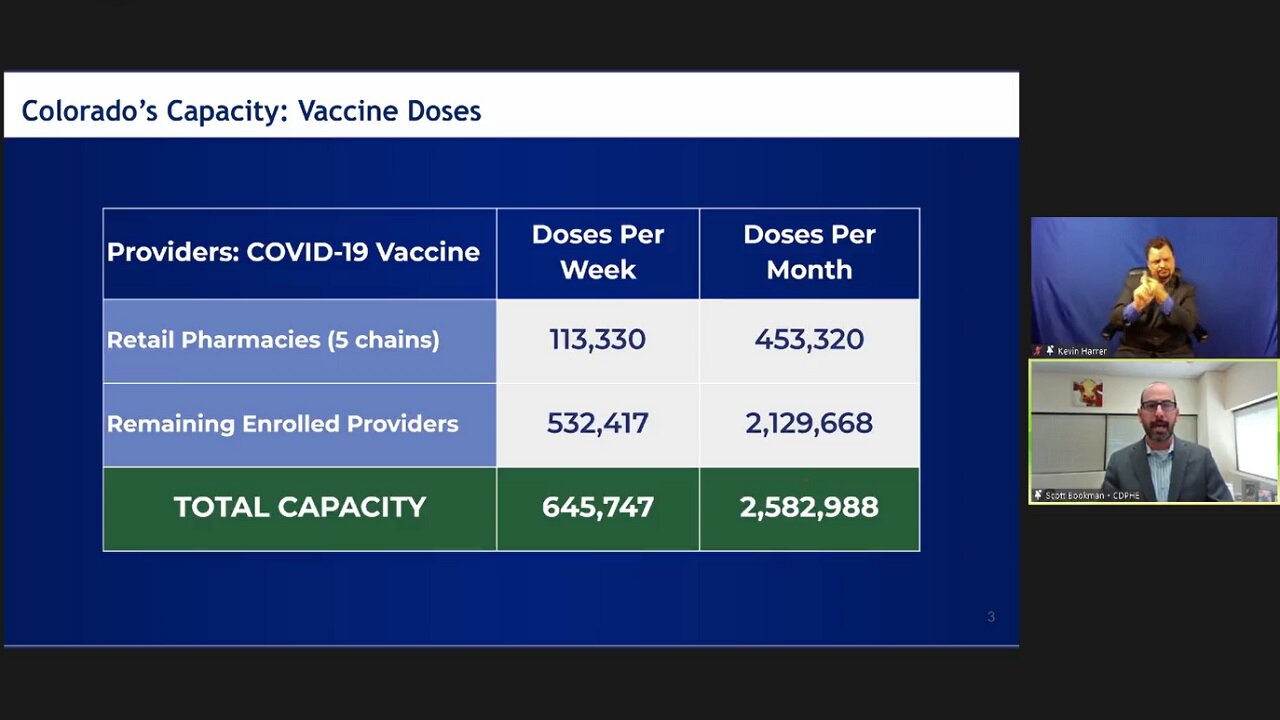Colorado COVID-19 Updates: Next steps to relieve hospital capacity

Every week, Governor Jared Polis gives an update on the COVID-19 virus in Colorado and ongoing efforts for the state to contain it. See below for the latest updates.
October 28, 2021 COVID-19 press conference
Current COVID-19 numbers in Colorado:
- 1,167 hospitalizations across the state. 904 of those people are unvaccinated.
- The average age of a vaccinated, hospitalized person is 73.
- The average age of an unvaccinated, hospitalized person is 57.
- 93% of ICU beds are occupied
Next steps to relieve hospital capacity
The governor said the way the numbers are trending the state is looking at taking five actions to help relieve hospital capacity. When asked by a journalist if there would be a reinstituted mask mandate or vaccine mandate, Polis referred back to these five actions to take first.

Polis said the state is already implementing step number five. Right now hospitals are the main distributors of monoclonal antibody treatment (mAb). The U.S. Department of Health and Human Services says it's a treatment that can reduce the amount of the SARS-CoV-2 virus (the virus that causes COVID-19) in a person's system. Having a lower amount means you may have milder symptoms will be less likely to need to stay in the hospital.
Starting now, the state is shifting that distribution from hospitals to places like urgent care or even mobile sites to reduce the burden on hospitals. Polis said if COVID-19 numbers do not decrease in the coming days, the state will be implementing more of these measures.
Vaccination distribution for kids ages 5 to 11
Colorado is preparing to receive thousands of more COVID-19 vaccine doses for younger children to start distributing soon. On Tuesday, October 26 the Food and Drug Administration (FDA) advisory panel voted unanimously to recommend the FDA approve the Pfizer vaccine for kids ages 5 to 11. A study of elementary schoolchildren found the Pfizer shots are nearly 91 percent effective at preventing symptomatic infection.
The FDA is expected to give approval on Friday, October 29. Based on these expectations the state put together the timeline below. The goal is to give out the first shots to that younger age group on November 5. Polis said the state's goal is to vaccinate 50 percent of Colorado's children in that age group by the end of January 2022.

Polis said the state is working with a number of organizations to create mass vaccination sites for younger kids. This includes places like zoos, museums, schools, and organizations that serve primarily children.
Polis also said the state has offered assistance to every school district if they want to hold their own vaccination clinic. No word yet on how many districts or which ones responded positively to that idea. Polis said the main focus initially will be bigger vaccination clinics where parents can even get their own booster shot as well.
"As a father of a 10 and a seven year old I'm particularly grateful. I know there are a lot of eager parents out there knowing their kids are only weeks away from this virus," said Polis.
October 21, 2021 COVID-19 press conference
Current COVID-19 numbers in Colorado:
- 1,130 hospitalizations across the state. 893 of those people are unvaccinated.
- 25 children are hospitalized; 16 of them are ages 0-11, and nine of them ages 12-17.
- The average age of a vaccinated, hospitalized person is 73.
- The average age of an unvaccinated, hospitalized person is 57.
- 90% of ICU beds are occupied.
The deadly COVID-19 virus is not tired of us
During Wednesday's press conference, Polis urged everyone, once again, to get vaccinated. "I think all of us are really more than tired of this pandemic. But the pandemic, the deadly COVID-19 virus is not tired of us," he said.
As hospitalizations continue to increase— currently, there are 1,130 people hospitalized with COVID-19—fewer and fewer beds are available. According to state epidemiologist Dr. Rachel Herlihy, while hospitalizations in the United States are decreasing, they are increasing in Colorado, affecting all age groups.
"Our older age groups might have less robust immune systems and might be more susceptible to see their immune system wane over time," she said. Herlihy emphasized the importance of older age groups receiving their booster dose to increase immunity.
"If you're unvaccinated, you are taking a great risk," Polis said.
Herlihy also mentioned that, overall the hospitalization rates are eight to 20 times higher in unvaccinated individuals than vaccinated individuals. Because of the high hospitalization rate, 90% of ICU beds are currently occupied across the state, meaning there are only approximately 120 ICU beds are available in Colorado.
"Surgeries are being canceled; brain surgeries, heart surgeries are being delayed because of a lack of availability to provide care to those patients because of the impact that COVID hospitalizations are going to have," COVID-19 Incident Commander Scott Bookman said.
"I think you can sense just sort of the frustration we have because we have the ability to end the pandemic. It'd be over. If we had everybody vaccinated, no pandemic," Polis added. "But we're not because about a quarter of Coloradans have yet to make the decision to protect themselves."
October 13, 2021 COVID-19 press conference
Current COVID-19 numbers in Colorado:
- 964 hospitalizations, 744 of those people are unvaccinated. (This is the highest number of hospitalizations since January)
- 1,216 new cases reported in one day
- 19 children are hospitalized, eight are ages 12-17, 11 are ages 0-11
A Crisis of the Unvaccinated
During Wednesday's press conference, Polis urged those who are still unvaccinated to receive the COVID vaccine as hospitalization rates are still increasing, the highest number the state has seen since January. "We're here because we have a crisis—a crisis of the unvaccinated," the Governor said.
Additionally, Polis called out some Colorado counties, like Eagle, Boulder and Broomfield, whose vaccination rates correlate with the county's population. While others, like Pueblo, Mesa and Weld, are lagging behind.
"There are a lot of Coloradans unnecessarily hospitalized because they didn't get the vaccine," he added.
Currently, 964 people have COVID in the state and of those hospitalized. Unfortunately, a small number of hospitalizations are children—eight are between the ages of 12 to 17 and 11 are aged 11 or younger. "There is no need to have anyone 12 to 17 hospitalized when the vaccine is available now," Polis said.
While the vaccine for children ages five to 11 is not yet available for distribution, Polis also urged for those 12 and up to get vaccinated.
"The vaccine is more effective for younger people," the governor added.
Governor Polis was joined by family physician Dr. Kyle Leggott from UCHealth and pediatric infectious disease specialist Dr. Sean O’Leary from Children’s Hospital Colorado. Both doctors expressed the importance of receiving both immunizations to prevent hospitalization and extreme COVID symptoms
"If you are hesitant, please reach out to your doctor's office or your clinic because we want to have those conversations with you," Dr. Leggott said.
October 6, 2021 COVID-19 press conference
Current COVID-19 numbers in Colorado:
- 922 hospitalizations, 212 of those are people who are vaccinated (This is the highest number of hospitalizations since January)
- 149 ICU beds are available in the state
- 22 children are hospitalized, 17 aged 0-11 and 9 aged 12-17
- 1,838 new cases in one day
- 77% of Coloradans have received at least one dose of a COVID-19 vaccine
- 4.8% of adults in the state have received a third/booster dose of the COVID-19 vaccine
Aurora Public Schools COVID-19 fight update
During Wednesday's news conference, Aurora Public School's superintendent, Rico Munn, spoke about the district's efforts to fight COVID-19.
"One of the things we know in order to accomplish our job is in-person learning environments must be safe, secure, and very rigorous. It became very clear as we've gone through this COVID crisis that we have to do everything we can to protect that in-person learning environment," said Munn.
He went on to describe how back in May, the district announced that once a vaccine had received full FDA approval there would be a requirement for staff to be fully vaccinated. When that approval happened for the Pfizer shot, APS gave its staff 45 days to comply with that mandate. That deadline is October 7.
The full numbers aren't in yet, but on Wednesday Munn said 96 percent of licensed employees are fully vaccinated. Munn expects that number to increase with the deadline and with some employees who are just partially vaccinated for now. There are some who qualified for medical or religious exemption, but Munn did not provide that exact number.
"We're incredibly grateful for our staff for stepping up and responding to this need for our students who need to be protected and have protection in our classrooms," said Munn.
APS does have regular COVID-19 testing as well through COVID Check Colorado and it recently signed up through the Colorado Department of Health and Environment (CDPHE) for regular surveillance testing at schools.
September 28, 2021 COVID-19 press conference
Current COVID-19 numbers in Colorado:
- 866 hospitalizations, 164 of those are people who are vaccinated
- 18 children are hospitalized, 12 aged 0-11 and 6 aged 12-17
- 1,897 new cases in one day
- 6th lowest state in the U.S. for per capita infection rate
- 3.9% of adults in the state have received a third/booster dose of the COVID-19 vaccine
Testing capacity in the state:
At Tuesday's news conference, Dr. Emily Travanty, the director of the state lab, spoke about the need for about testing capacity in the state. Both she and Governor Polis emphasized the importance of testing to fight the spread of COVID-19.
"As an individual you want to know early because there are treatments available," said Polis. "We also care a lot about testing at the population level because the sooner people know and self-isolate the lower the R-naught, the lesser the spread of the virus. Very important to identify early."
Related Stories
September 13, 2021 COVID-19 press conference
A recently published article by an international group of scientists isn't swaying Colorado's plans to administer COVID-19 booster shots. In fact, it ignited a somewhat fiery response from Governor Jared Polis.
The opinion piece was published in The Lancet on Monday, September 13. The scientists, which includes two leading vaccine reviewers at the Food and Drug Administration (FDA) believe the average person doesn’t need a COVID-19 booster yet. The experts reviewed studies of the vaccines’ performance and concluded the shots are working well despite the extra-contagious Delta variant, especially against severe disease.
The two FDA scientists a part of this article, Drs. Phil Krause and Marion Gruber, recently announced they will be stepping down this fall. The New York Times reports one of the reasons they were upset was because of the Biden administration's announcement for adults to receive booster shots about eight months after they receive their second dose.
"We can all celebrate the news that Marion Gruber and Phil Krause have left the FDA in disgrace over unnecessary delays over the booster. They have blood on their hands, and there are thousands of Americans who are dead today because of their delays of the booster shot," Polis said when asked during a September 13 news conference about The Lancet article.
"What the article shows is of course the truth that the first two vaccines are highly effective at preventing severe cases, but what we are finding are two things," said Polis. He went on to say out of the 914 people hospitalized in Colorado with COVID-19, 155 of those have been fully vaccinated as of September 13.
The governor claimed that if the booster shot had been administered a month or two ago, that number would be much lower.
A study released last month from Israeli scientists shows booster shots of the Pfizer-BioNTech vaccine are highly effective against both coronavirus infection and severe COVID-19. Israel began administering third Pfizer doses in July.
The FDA is scheduled to meet Friday, September 17 to discuss approving the Pfizer booster shots. Polis hopes the FDA gives approval and those boosters can start wide distribution on Monday, September 20.
"So the delta, the change, is significantly smaller than the protection of the first two vaccines offer, but at the very least the FDA should get out of the way for people to make the choice to protect themselves," Polis said. "It's a choice my parents made; it's a choice that many of their friends made; it's a choice many well-educated Coloradans have already made. But for us to continue with our equity efforts around the booster shot, which is widely available, we simply need the FDA to get out of the way and allow us to proceed with protecting more Coloradans."
He went on to say that even though most COVID-19 cases among the fully vaccinated are mild, adding a booster shot could reduce the number of transmissions.
"The benefits outweigh the costs overwhelmingly. The FDA needs to get out of their ivory tower and realize there's a real-life pandemic," said Polis. He went on to cite high hospitalization numbers in Colorado and around the state. And then continued with, "We have the ability to end it. We need to show the will to end it. And while the two-course vaccine is the primary tool to do that, there's an added benefit to the booster shot."
In the press conference, state officials some of the tactics included in their plan to provide the booster shots. This is assuming the Pfizer booster gets approval and can be distributed by September 20 and the Moderna approval follows shortly after. The distribution plans include setting up clinics in long-term care facilities and possibly small-to-mid-sized drive-through sites in major Colorado cities.

Working with the Colorado National Guard, the state put together a timeline of the expected number of booster shots to be distributed for the next six months. The agencies are predicting the peak demand for the booster to be in late October.
Lt. Col. Jamie Pieper with the Colorado National Guard did say these numbers are based on the assumption that 100 percent of Coloradans who received the first two doses of a COVID-19 vaccine will decide to get a booster shot.
Analysis with the state, health care agencies and other partners that provide the COVID-19 vaccine showed how much the state could handle as far as vaccine distribution. Scott Bookman, the COVID-19 incident commander with the Colorado Department of Public Health and Environment (CDPHE), said the state could give out more than 645,000 doses per week, and more than 2.5 million in a month.

So far, the state says 2.4 percent of Colorado adults have received a booster. That is a little more than 72,000 people. Anyone who considers themselves high-risk or immunocompromised can get a booster now. Bookman also noted there is at least one site in every county that can distribute COVID-19 vaccines.
75.27 percent of eligible Coloradans have received at least one dose of the vaccine. The state is expecting that number to increase in coming weeks with more employers now requiring it. Last week, President Joe Biden announced sweeping new vaccination requirements, including a rule that all employers with more than 100 workers require them to be vaccinated or test for the virus weekly.
What is missing from the COVID-19 booster shot conversation is where people who received the Johnson & Johnson one-dose vaccine fit in. Last month, U.S. Surgeon General Dr. Vivek Murthy said that Johnson & Johnson recipients will “likely need a booster.” The government needs more information before making a recommendation. The delay is largely due to the fact that the Johnson & Johnson vaccine became available three months after Moderna and Pfizer.
[Related: What to know about booster shots if you received Johnson & Johnson’s COVID-19 vaccine]
Polis is not happy with the lack of guidance for those who got the Johnson & Johnson shot. Once again during the September 13 news conference, he criticized the FDA.
"They need to get off their rear-ends and provide that guidance," Polis said. "They need to get the booster out; they need to get the kids' vaccine approved, and they need to tell people who got the Johnson & Johnson how—if they choose to—[they] can increase their protection level."
Amanda Horvath is a multimedia producer with Rocky Mountain PBS. You can reach her at amandahorvath@rmpbs.org.
State employees vaccinated:
Polis also provided numbers on how many state employees are currently vaccinated. He said that rate is at about 78 percent, that is slightly higher than the current rate of Coloradans who are vaccinated. Polis is currently not requiring all state employees to get vaccinated, but he is requiring either proof of vaccination or twice-weekly COVID-19 testing.
Hospital staffing concerns:
Hospitals are among the organizations where workers are now required to get vaccinated. There has been some concern this will lead to more staffing shortages among hospitals.
The state does keep track of the data for hospitals who are expecting a shortage within the next week. Currently that is at 28 percent of hospitals.
"The vast majority of, the overwhelming majority of frontline health care workers and doctors and nurses are begging their fellow Coloradans to get vaccinated," said Polis.
He went on to say President Joe Biden's mandate requires any place that accepts Medicaid or Medicare must require employees to be vaccinated. So there are no possibilities for exemption.
"This has been a grueling year in health care. I want to thank our nurses, our hospitals, our doctors. They've been called upon time and time again," said Polis. He went on to add: "It's simply a function of human nature that many people who work in the field are burning out or are burnt out. And to those who are working in our hospitals I want to encourage you to stick with it and also on behalf of the grateful state of Colorado, thank you."
Polis went on to say that the state is exploring "short-term, medium and long-term ways" to address hospital staffing shortages. He said there is a problem with a shortage outside of the pandemic and there are talks happening between the governor's office and the state legislature on workforce development.
FDA review of Pfizer data from vaccine trial for kids aged 5-11:
"I want to thank the FDA for understanding we are in a pandemic and we need to move quicker than usual," said Polis.
That's quite the different tone from the governor from just a week ago when he called on the FDA to "get out of the way" and let people protect themselves against the virus. Even just on Monday in a press release, he called on the FDA to "cancel their weekend plans and postpone other agenda items to meet immediately to review the data."
This week Pfizer announced results of their trials for the COVID-19 vaccine for kids aged 5-11. The company says their early results indicate the vaccine is safe for children and establishes a strong antibody response against the virus.
"They [the FDA] need to review that data expeditiously, meaning look through it, schedule the meetings quicker. A difference of a few weeks can save lives," said Polis.
He went on to say he hopes the FDA will approve this dosage of the Pfizer vaccine for kids in that younger age range by the end of the month or early October. Polis has two children of his own in that age range and is a big advocate for vaccination against COVID-19.
September 21, 2021 COVID-19 press conference
Current COVID-19 numbers in Colorado:
- 876 Hospitalizations
- 204 ICU Beds available
- 14 children hospitalized, 8 kids aged 0-11 and 6 kids aged 12-17
- 1,779 new cases
- 7-day moving average of positive tests is 6.29%
- 6th lowest state in the U.S. for per capita infection rate
At-home tests announcement:
Governor Polis says the state has recently acquired two million at-home Binax tests. Given these new tests the state is relaunching an initiative to provide at-home testing for Coloradans. People can receive as many as eight tests from this program. Just go to the website the state created to sign up for those tests to be sent to your home. You should receive the tests within four to six days of ordering. The governor also said there is a backlog of people who ordered the tests when there were none available who will be getting those automatically.
"Please use them. Don't request them and then keep them in your closet," said Polis as a message to people ordering the tests.
More in-depth data on COVID-19 numbers:
State epidemiologist Dr. Rachel Herlihy provided some more data on the trends we are seeing with COVID-19 in the state.
"Overall, it looks like we are seeing a gradual decline to a plateau at this point," said Herlihy. "What makes me nervous about this time of year is that fall is a transition time. We move indoors, the weather gets cooler...so there is that possibility that we could be looking at a potential increase in cases once again."
In addition, Polis mentioned the supply for the school COVID-19 testing program is higher than the demand; he hopes more schools take advantage. Schools can get more information and still sign up at this website link.
[Related: New $10 per week incentive for K-12 students to get weekly COVID-19 testing]
Polis and Dr. Travanty also reiterated last week's news of more at-home tests becoming available. So far, the state has shipped more than 70,000 tests. However, some people have complained of wait times when ordering the tests. Polis said the state estimates that delivery time to be between seven and 14 days, but there is a backlog of orders before the state got the recent shipment of Binax tests. Polis said once the state catches up, he said the state should be able to keep up with demand.